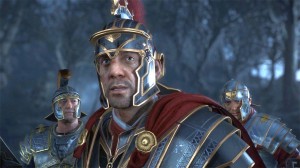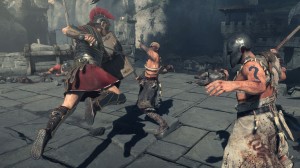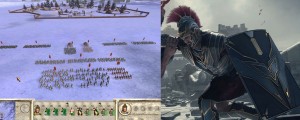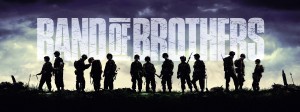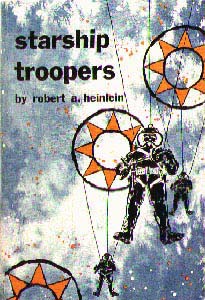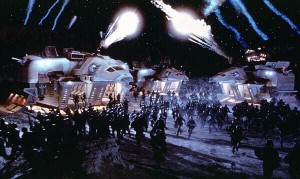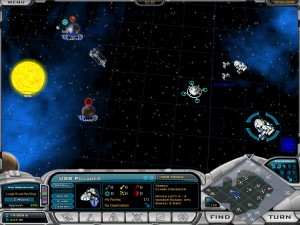-Ryan J. Hodge
For someone who enjoys a great story, is there anything better than a narrative that engages you from the very start? Imagine a world so rich you can almost smell the scents in the air, a delivery so clever it forces you to think in a way you never thought you would. I’m Ryan J. Hodge, author, and I’d like to talk to you about…Video Games.
Yes, Video Games. Those series of ‘bloops’ and blinking lights that – at least a while ago – society had seemed to convince itself had no redeeming qualities whatsoever. In this article series, I’m going to discuss how Donkey Kong, Grand Theft Auto, Call of Duty and even Candy Crush can change the way we tell stories forever.
What the Strategy Genre teaches us about logical story telling.
Beyond the town’s meager wooden walls, the Germanic tribal horde assembled. The settlement was on the frontier, well north of the Rubicon, far away from Rome’s alabaster halls, and –more importantly- weeks away from any force that could with any seriousness be called an ‘army’. And each poor young soldier manning those walls knew it.
The barbarian host offered no pretense of tactical organization. They simply charged, their horns bellowing and feet thundering; confident that the riches and women of the town before them was theirs for the taking. As soon as their ladders touched the wall, there was little doubt as to which way the tide of battle would flow. The brave Roman town watch puts up an admirable fight. At the very least, they know better than to allow themselves to be captured alive. But chasing pick-pockets and rousting drunkards proves poor training in the face of a barrel-chested tribal and his broad, iron weapons.
Ten men of the Roman hastati, having watched their entire cohort butchered before their eyes, lose their nerve and flee for the town square while the dying screams of their comrades echo behind them. They cower in an alley as the battle rages on and there, they remain until the clash of metal quiets and is replaced with the steady drum of footsteps. An undisciplined mob of German spearmen lazily amble their way into the square. They are all that remain of what was once a greater host, but are confident that there is no one in this settlement left to oppose them. Their long pikes are pointed harmlessly skyward, their backs are turned, and the hastati suddenly remember their training.
The young Romans loose their pila into the backs of the unsuspecting tribesman and charge with gladii in hand. Before those impaled by the javelins even fall, the hastati are hacking at the barbarians like men possessed. With more than a dozen dead before they’ve even drawn a sword, the Germans hesitate as they watch their Captain’s throat opened ear-to-ear by a Roman blade. The tribesmen panic. They run. And ten hastati stare in disbelief as the barbarians flee the walls. The sun sets, but the settlement still belongs to Rome.
This account is not historically accurate, but it is nonetheless true. I know, because I commanded that battle and I did so thanks to the brilliance of Strategy Games.
From war stories to political intrigue, it can be tough for the layperson to understand the complexities of combat and conquest without having lived them. It’s easy to imagine a battle consisting of not much more than two armies smashing into each other. Oh, we understand that there is some maneuvering involved, but ultimately it’s pretty straight-forward…isn’t it?
Well, no. Not at all. Anyone who’s read a military memoir knows that deceit and daring will carry the day farther than brute strength alone. However, while it’s one thing to acknowledge this and have some surface-level appreciation for the great battles, it is quite another to command Caesar’s legions for yourself.
Now some might say that the events of the above skirmish were obviously designed to play out that way; that the programmers wanted me to have that desperate final push. However, this is not the case. While all parties involved were acting in accordance with a set of prescribed logic routines, all of these events were entirely unscripted. Victory or defeat that day would have been my own, not the developers’.
By the way, this was not some ultramodern, high-tech assembly of compelling voice acting, realistic models, or heuristic AI. It was a simple war sim; nothing more than a somewhat advanced version of Chess.
Yet, as you can see, for a single simple skirmish, there was no shortage of compelling human drama; a story just waiting to be told. Moreover, given that no two games of Total War play out precisely the same, it’s a story that I am the sole witness to.
From Civilization to Command & Conquer, strategy games offer us writers a rare luxury; a fully realized fictional framework upon which we can project characters, dialogue, and details that are uniquely our own.
Beyond even that, however, we are given an even more valuable tool: an understanding of how these conflicts go. It is easy to fall into a bad habit of telegraphing every inevitable downturn or betrayal in the plot. A writer might feel compelled to write the ‘bad guy’ as…well… a bad guy; but when one is immersed in a narrative situation where there are no characters, only circumstances, the thought process changes and can lead to surprising results.
Take, for instance, the military memoir Band of Brothers (1992, Stephen Ambrose) which may be better known by the 2001 Television adaptation of the same name. In these memoirs, the soldiers of the 101st Airborne recall their service during WWII. The result is several harrowing adventures in combat that becomes a cohesive story that is as compelling as it is unpredictable. We, as the audience, ultimately know how the war itself turns out; but what will become of the characters is utterly unknown. At any moment a well-liked squadmate (who might otherwise endure to the end in a work of ‘pure’ fiction) could be shredded by artillery. He would have no poignant last words, nor heartfelt remembrance; just blasted apart in an instant. This knowledge raises the emotional stakes of each conflict as we watch the bullets whiz by our heroes’ ever-vulnerable heads.
However, clever readers may remark that this is a dramatic retelling of historical accounts. Incorporating this into fiction, by definition, requires working these elements into a plot from scratch.
For such an example, I would refer the reader to Starship Troopers (1959, Robert A. Heinlein). According to the continuity of the plot, the enemy ‘arachnoids’ (who dwell in some distant part of the galaxy) are never taken too seriously until they launch a devastating strike against the Terran Federation; a strike that lands on a major urban center. In response, the Federation launches a massive invasion of the Arachnoid homeworld; suffering massive casualties with very little actual strategic gains.
Realizing that they had underestimated their enemy, the Terrans change tack to strike at their enemy with air vehicles and small, coordinated strike teams. The story ends when such a strike team encounters a ‘brain bug’ which serves as an analog of a primary logistics officer. (A ‘mastermind’, if you will).
Astute readers will probably have recognized the patterns displayed in this plot echoed in the modern ‘War on Terror’. The 9/11 attacks run in parallel to the bombardment of Buenos Aires. The ‘primitive’ and ‘beatable’ arachnoids proved a rather difficult enemy to suppress, just as Al Qaeda’s influence still lingers to this day. Just so, the brain bug’s capture is comparable to the destruction of Osama bin Laden.
What is rather remarkable about the novel (particularly when compared to the 1997 film of the same name), is a decided lack of combat passages. Juan Rico is not the puzzle piece to solve the universe. He is remarkable in terms of his drive and ability, however he is but a single soldier who finds himself in the right place at the right time, as a larger story unfolds around him (rather than because of him).
By allowing circumstances to dictate the beats of the plot (rather than actions alone), we can create these ‘incidental heroes’; whose struggles and trials are no less than those of ‘Epic-Style Heroes’, but are much more grounded.
In another of these strategy games, Galactic Civilizations II, I led an entire civilization as it expanded into the stars. Of course this endeavor led to war, and fighting in this was a Comet Class Medium Cruiser designated MMC-03-012. Christened ‘Peacemaker’, its pre-war career consisted of little more than chasing pirates and other nuisances away from my frontier worlds. However, as conflict raged, it was assigned to larger battle groups thrust at the enemy. The Peacemaker, in particular, had a very unique career among her sister ships. When she was ordered to or from a repair station, almost per instance, she would blunder into a small enemy infiltration flotilla that had bypassed my picket ships. With no choice but to fight, the often wounded Peacemaker would somehow emerge victorious; dashing whatever machinations the enemy had in store.
Imagine a novel set around her crew; their uncertainty when called to the front, their dread when caught alone and damaged, their elation and praise as they send one enemy after another packing, and their fatal overconfidence as they engage in one battle too many. All of this, of course, exists within the context of a larger war; one that they contribute to but ultimately have no control over.
From starfighters screaming across the stars to soldiers huddled in muddy trenches; empathizing with your tiny pawns of war can be a stimulating experience for a writer. Without unnecessary characterization and dialogue; we are no longer burdened by plot needs (and are thus freed from plot holes). By providing a pre-made, but unique, narrative landscape that can be populated later with characters and their machinations; a single battle in a single strategy game can provide enough drama for an entire novel. Who knows? It just might make you a better writer.
Ryan J. Hodge is a Science Fiction author and Lead Writer & QA Manager for Konami Digital Entertainment US (SF Office). His latest book is Wounded Worlds: Nihil Novum, is available now foreBook & Paperback.
Media
Band of Brothers (1992) Stephen Ambrose, Simon & Schuster
Band of Brothers (2001) HBO –TV
Galactic Civilization II: Dread Lords (2006) d.Stardock p.Paradox Interactive –PC
Ryse: Son of Rome (2013) d.Crytek Frankfurt p.Microsoft Studios –Xbox 1
Rome: Total War (2004) d.Creative Assembly p.Activision -PC
Starship Troopers (1959) Robert A. Heinlein, G. P. Putnam’s Sons
Starship Troopers (1997) TriStar Pictures, Touchstone Pictures


